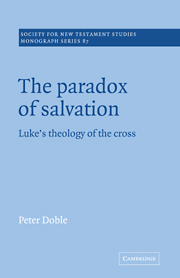Book contents
- Frontmatter
- Contents
- Preface
- List of abbreviations
- PART I Luke's theology of the cross: preliminary matters
- PART II Substantial matters: three distinctive elements at Luke 23.46, 47
- PART III Echoes of Wisdom in Luke's theology of the cross
- 7 Wisdom in Luke's passion story
- 8 Towards a Lukan theologia crucis
- Bibliography
- Index of biblical references
- Index of authors
7 - Wisdom in Luke's passion story
Published online by Cambridge University Press: 15 December 2009
- Frontmatter
- Contents
- Preface
- List of abbreviations
- PART I Luke's theology of the cross: preliminary matters
- PART II Substantial matters: three distinctive elements at Luke 23.46, 47
- PART III Echoes of Wisdom in Luke's theology of the cross
- 7 Wisdom in Luke's passion story
- 8 Towards a Lukan theologia crucis
- Bibliography
- Index of biblical references
- Index of authors
Summary
Il y a beaucoup de raisons d'affirmer – constatait G. Kuhn il y a plusieurs années déjà – que le livre de la Sagesse jouissait d'une grande estime chez les auteurs du Nouveau Testament. On le lisait assidûment et ses traces se retrouvent aujourd'hui aussi bien chez saint Paul que dans l'Apocalypse, dans les Evangiles, et, peut-être, dans l'Epître aux Hébreux et dans l'Epître de Jacques.
(Romaniuk, 1968, p. 498)Starting with this quotation from Kuhn, Romaniuk set out to identify traces of Wisdom in the New Testament. This chapter's purpose is more focused: it will examine whether in Luke's passion narrative there is evidence of the ‘assiduous reading’ of Wisdom alleged by Kuhn, whether ‘traces’ of the book can be found (hereafter called ‘echoes’), and whether such echoes may count as evidence for Luke's knowing and using Wisdom. Romaniuk identified a trace of Wisdom in Matthew's passion narrative (1968, pp. 499f.) but turned to Luke's description of the end of the world, echoing God's judgment on the ungodly (Wis. 5.22–3), for evidence of Luke's use of the book. What follows is not so much a dialogue with Romaniuk's article, which offers no more than two sides of a page on three Synoptists, but rather a keeping in mind what he set out to do and occasional reflection on his findings.
Close study of Luke 23.46–7 clarified three issues which lead towards understanding Luke's theologia crucis.
- Type
- Chapter
- Information
- The Paradox of SalvationLuke's Theology of the Cross, pp. 187 - 225Publisher: Cambridge University PressPrint publication year: 1996



